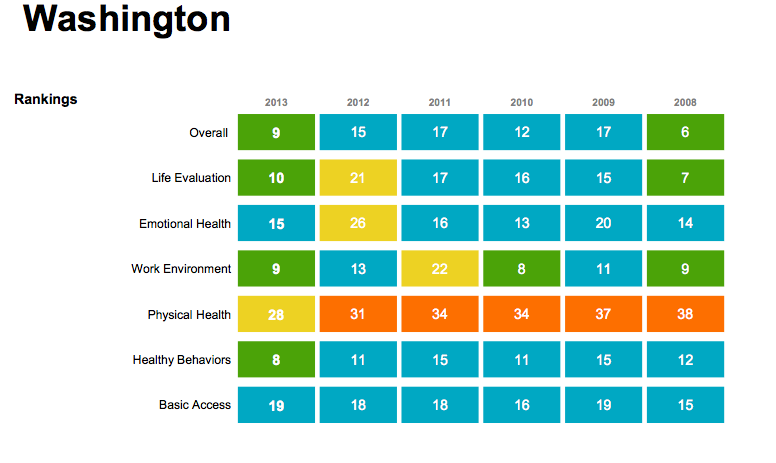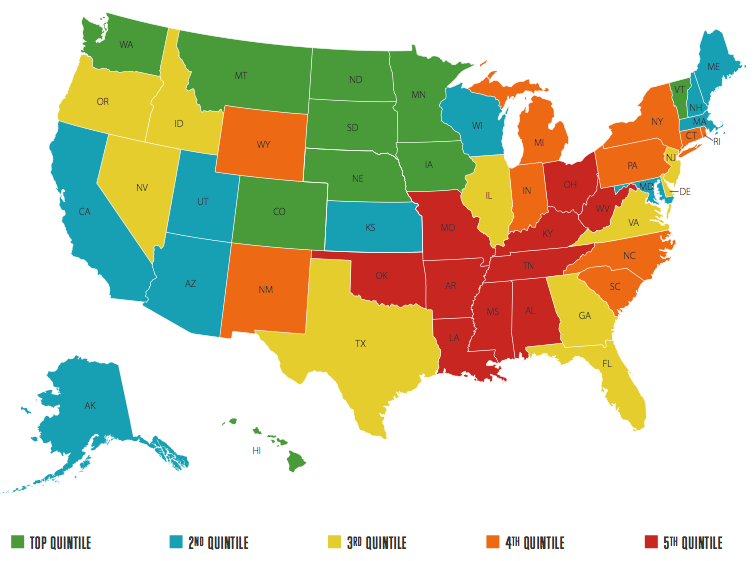Human well-being is central to the economic health of employers, employees and regions, and Washington state is a top performer nationally, according to the recently released Gallup-Healthways State of American Well-Being Index for 2013.
Washington ranked in the top quintile, or first 20 percent, at ninth of 50 states – getting closer to its 2008 high of sixth than in the last four years. The index also assessed for well-being 189 metro regions in the U.S., large and small. Its Washington State report shows four in the top quintile nationally: Bellingham was 12th, Bremerton-Silverdale 24th, Tri-Cities 28th, and Seattle-Tacoma-Bellevue 32nd.
Authors of the report say recent historical metrics like unemployment, GDP, and health statistics are essential, but to foster change leaders also need to know “what their constituents are experiencing.” The Index is based on respondents’ self-assessments in six areas:
- current and expected life situation
- recent emotional health
- physical health
- healthy behaviors, or lifestyle habits known to be tied to health outcomes
- work environment
- and “basic access” to 13 necessities such as food, shelter, health care and housing
Washington in 2013 ranked in the first quintile among the 50 states not only overall but also for life evaluation, work environment, and healthy behaviors; in the second quintile for emotional health and basic needs; and third quintile for physical health, which apparently doesn’t always correlate with self-reported healthy behaviors.

- State of American Well-Being Index 2013/Gallup-Healthways
Nationally, states in the Central and North Plains tended to rank highest and those in the South, Midwest and Northeast lowest.

- State of American Well-Being Index 2013/Gallup-Healthways
In the report, Gallup Chairman and CEO Jim Clifton and Healthways CEO Ben R. Leedle Jr. write, “….well-being is a metric that you can no longer afford to ignore in your population. It’s predictive, it’s actionable, and it correlates with the metrics that matter most to your business – productivity, performance and cost…”
They add, “Chronic disease and obesity are on the rise, healthcare costs continue to be the Number One expense item for many businesses, and workers tell us that relationships in the workplace have declined significantly over the past six years. It’s time for leaders at all levels in all sectors to take notice.”
Perhaps not surprisingly, the results of the national annual survey, which began in 2008, show well-being is highest among “professionals, mangers and business owners” and lowest among “transportation, manufacturing and installation, and repair workers.”
Derek Long, Executive Director of the Bellingham-based consumer and business education and advocacy group Sustainable Connections, has lived in the Bellingham-Whatcom County region for 13 years. He says that employers can take positive steps to accent workplace well-being.
“My experience in Washington, and Seattle and Bellingham-Whatcom County in particular, leads me to believe that, in general, employers are thinking hard about their own happiness and they feel their teams deserve nothing less. There is openness to new ideas on what a workplace looks like and how it operates. Workplace experimentation and technology are creating opportunities for employees to work when and where they are most productive. When folks feel like they are contributing at a high level in a way that works for their life, they are satisfied.”
The report provides recommendations on how to improve well-being. It says employers, health plans, and doctors should accent wellness strategies that go beyond preventive health care, encompassing well-being components such as purpose, and social, financial, community and physical determinants. Leaders must promote a culture of well-being, and communities should make physical activity “easy and safe,” the report also recommends.
Another contributor to well-being, says Long, is philanthropy and volunteerism. “Giving leads to happiness. I am an especially big fan of opportunities for people to give time, money and other resources in their own communities that lead to a greater sense of pride of place and confidence in your home town.”
(Notes: For states the new report is based on 2013 survey responses; for metro regions, 2012 and 2013 surveys are combined in the 2013 report to boost sample sizes and accuracy of the results. Further details on methodology are on p. 37 of the report.)
